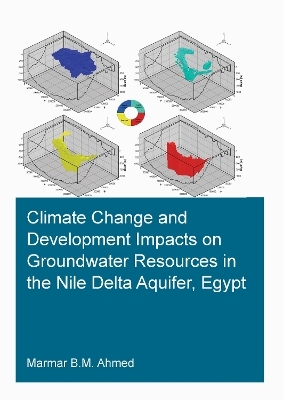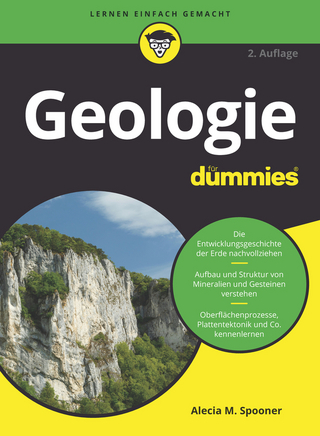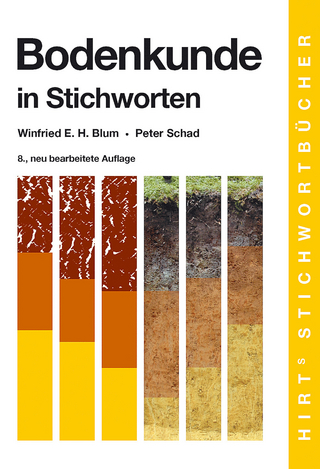
Climate Change and Development Impacts on Groundwater Resources in the Nile Delta Aquifer, Egypt
CRC Press (Verlag)
978-0-367-68345-0 (ISBN)
Climate change is likely to continue to have severe impacts, including sea level rise. At the same time, population increase and development imperatives create additional pressure on available water resources. These changes are problematic for the Mediterranean coastal areas and especially the Nile Delta coast. Particular focus of this study is on salinization of groundwater resources in the Nile Delta Aquifer (NDA) due to saltwater intrusion. To assess current conditions and develop future adaptation strategies for the NDA, a 3D model simulating regional variable-density groundwater flow and coupled salt transport was constructed based on available data set, using the SEAWAT code. A method for identification of the most representative model has been developed, based on testing different simulation periods during which the NDA has ‘evolved’ from completely fresh groundwater conditions to conditions representative for the year 2010.This model was then applied to analyze possible future NDA conditions under several predefined scenarios of sea level rise and groundwater extraction. This analysis indicated that the impacts from further extractions of groundwater on availability of fresh groundwater in the aquifer are more significant compared to those from sea level rise. Furthermore, three different adaptation measures and their impacts in the Sharkeya Nile Delta governorate were tested. It was shown that that changing crop types and irrigation practices towards water saving options seem to be more promising than artificial recharge with injection wells or extraction and usage of brackish groundwater after desalination. The developed model is useful for further Water-Food Nexus studies.
Ms. Marmar Badr is a water engineer with 22 years with diverse experiences in the fields of hydrogeology, transboundary and regional water issues in the Nile basin countries and groundwater management. Marmar is currently working as the head of the technical office of the Nile Water Sector, Ministry of Water Resources and Irrigation in Egypt. She started as a hydrologist in 2001 in the Nile Water Sector (Ministry of Water Resources and Irrigation). Her main responsibilities have included, but are not limited to, hydrological data processing, river Nile forecasting, analysing the hydrological and meteorological data of the Nile basin. She has worked on a wide range of water management issues and in multidisciplinary research projects. In 2006, she worked as a project manager in the National NBI Office (NBI – Nile Basin Initiative – is a partnership initiated and led by the riparian states of the Nile River to develop the river in a cooperative manner). Her main role was to provide overall coordination and support to the integrated water resources planning and management project. She graduated from the Faculty of Engineering, Cairo University, as a civil engineer. She received her master degree in water resources management from Tanta University, Egypt. Her thesis was titled "management of subsurface water in Fayoum governorate and its effect on soil behaviour" in which she studied recent theories and approaches in the field of groundwater management. She obtained a professional diploma in information technology at the American University in Egypt. She has taken a number of training courses which cover several fields, e.g., guidelines for good practice of water policy, assessing the impacts of climate and global change on groundwater resources, groundwater modeling, Nile decision support tool program, preparing demand scenarios for agricultural water in Nile Basin for 2030, negotiation skills and conflict resolution, results oriented monitoring and evaluation for international projects. She participated in different research projects dealing with vulnerable fresh groundwater resources due to climate change in Egypt. This book has been written during her Ph.D. studies at IHE Delft, the Netherlands, on the issues of climate change and development impacts on groundwater behaviour in the Nile Delta, Egypt.
1. Introduction, 2. A review of saltwater intrusion in the Nile Delta groundwater system, 3. Assessing the fresh-saline groundwater distribution in the Nile Delta aquifer using a 3D variable-density groundwater flow model, 4. Impacts of sea level rise and groundwater extraction scenarios on fresh groundwater resources in the Nile Delta governorates, Egypt, 5. Adaptation measures to the impacts from groundwater salinization threats in the Nile Delta Aquifer, 6. Conclusions and recommendations.
| Erscheinungsdatum | 16.01.2021 |
|---|---|
| Reihe/Serie | IHE Delft PhD Thesis Series |
| Verlagsort | London |
| Sprache | englisch |
| Maße | 170 x 240 mm |
| Gewicht | 258 g |
| Themenwelt | Naturwissenschaften ► Geowissenschaften ► Geologie |
| Naturwissenschaften ► Geowissenschaften ► Hydrologie / Ozeanografie | |
| Technik ► Bauwesen | |
| Technik ► Umwelttechnik / Biotechnologie | |
| ISBN-10 | 0-367-68345-8 / 0367683458 |
| ISBN-13 | 978-0-367-68345-0 / 9780367683450 |
| Zustand | Neuware |
| Informationen gemäß Produktsicherheitsverordnung (GPSR) | |
| Haben Sie eine Frage zum Produkt? |
aus dem Bereich


